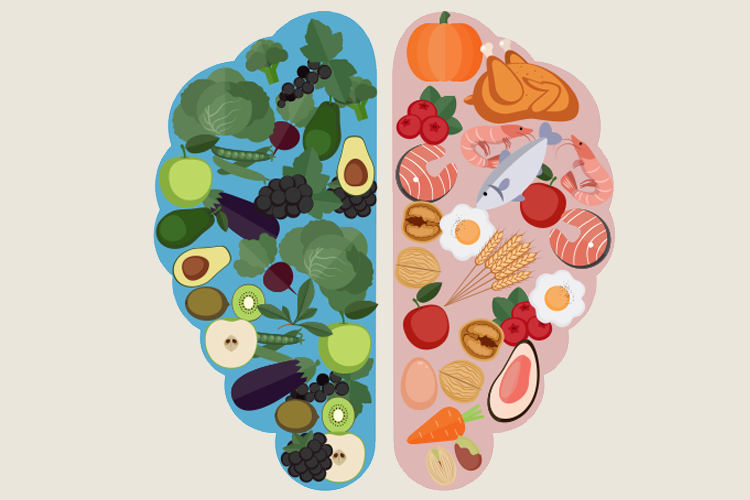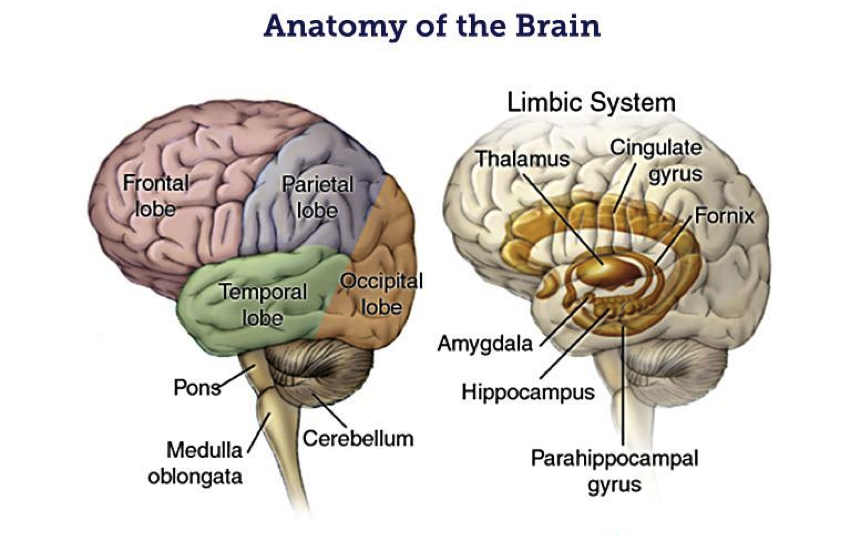Blog
Impact of western diet on brain function
 Does what we eat effect the physical structure of our brain? Sure, we feel a bit foggy after an afternoon slice of cake, or a bit dazed following Friday night fried fish and chips. But it is temporary, right? Well, apparently not.
Does what we eat effect the physical structure of our brain? Sure, we feel a bit foggy after an afternoon slice of cake, or a bit dazed following Friday night fried fish and chips. But it is temporary, right? Well, apparently not.
In 2015, results of a cohort study were released, reporting that diets comprising of high intakes of unhealthy foods, and lower intakes of nutrient dense foods were associated, independently with small left hippocampal volume. (2) So what does this mean?
The brain 101
Before we delve any further, let us understand the basic of the brain, to further understand what this study is trying to convey.
The brain – a wonderful and complex component of the body – is comprised (very broadly) of the cerebrum, cerebellum, brain stem and limbic system. They are then broken down as follows:
- Cerebrum: comprised of frontal, parietal, temporal and occipital lobes. Being the largest part of the brain, it takes care of most functions, including (but certainly not limited to) intellect, behaviour, reasoning, personality, and physical reaction; sensory comprehension, language, and reading; speech and hearing capabilities; and vision control.
- Cerebellum: known as the ‘little brain’, in charge of balance, posture and coordination.
- Brain stem: comprised of midbrain, pons and medulla. These care of basic life functions, like breathing, heartbeat and blood pressure, and enable physical motor function to take place.
- Limbic system: comprised of amygdala, hippocampus, hypothalamus and thalamus. Very broadly, the limbic system is in charge of mood, memory, emotion relay and hormonal and sensory response.
The hippocampus, the area of the brain assessed in this study, works in conjunction with the cerebrum in memory, including converting temporary memories into permanent, and an area of the brain critical for learning and spatial awareness. The hippocampus is also implicated in regulation of mood.
Considering the primary functions of the hippocampus, it may not come as a surprise that it is the first area of the brain to be damaged in Alzheimer’s disease, resulting in memory loss, disorientation and mood disorder.
These symptoms are not resigned to those with Alzheimer’s however, as hippocampus deterioration can come with age and stress, resulting in similar issues like recalling where you last left the keys.
Where does diet fit into all this?
Nutrient poor vs nutrient dense diets
In assessing the impact of diet on hippocampal function over 4 years, a poor diet was described as the ‘Western’ diet, with regular consumption of hamburger, steak, sausages, crisps, chips and soft drink. It was compared with a healthier diet, which centers on consumption of fresh vegetables, salad, fruit and grilled fish. It is good to note that participants involved were 46% female, an average age of 62, and a majority were normal to slightly overweight.
It found lower intake of healthy foods and higher intake of foods typical to a Western diet resulted in decreased hippocampal volume.
The Western diet – typically high in trans fat, processed foods and refined sugars – is pro-inflammatory and inhibits the growth of new brain nerve tissue, impacting on hippocampal function and volume. (5)
Sugar has been specifically identified to impact cognitive function, due to its involvement in insulin resistance – which can limit blood flow and nutrient delivery to brain tissue, impacting learning and memory. (1) Needless to say, the impact of high-refined sugar intake encourages inflammation and oxidative stress, not helping the situation.
Whilst implicating factors in dementia and depression are many, this study very importantly highlights the impact of diet on the health of the hippocampus, and incidence of such conditions. In fact, there is increasing evidence for the relationship between poor diet and conditions such as cognitive decline and depression. The good news is a nutrient dense diet appears to reduce the risk for such conditions. (3,6)
So the very food we eat can also improve brain health!
How to help your hippocampus
Nourish your brain with the following foods:
- Antioxidants: found in foods such as vegetables – especially leafy greens, berries, spices, herbs, nuts, and green and white teas. Get a variety of colour, and you are onto a good thing.
- Omega 3 Fatty Acids: best known to be found in wild caught salmon, but also in abundance in mackerel, sardines, algae (it’s where the fish get their omega 3s from), leafy greens, flaxseeds, chia seeds, and walnuts. Think about – walnuts even LOOK like brains!
- Flavonoids: basically pick a vegetable or a fruit, and you are likely to get a dose of this amazing phytonutrient. Like antioxidants, go for an array of colour at each meal and throughout the day.
The Mediterranean style diet has been found to reduce risk of cognitive decline, and possibly a feasible dietary approach for those accustomed to a Western style diet, as it offers a variety of whole foods from a range of foods groups. (4) What is really comes down to, is eating real, whole food.
As always, we talk a lot about just eating real food. And it is the same in the case of helping the brain to do its brainy thing. Choose whole, minimally processed foods, mostly vegetables, and in an array of colours, to help keep you as sharp as a tack.
References:
- Barnes, JN, & Joyner, MJ 2012, ‘Sugar highs and lows: the impact of diet on cognitive function’, The Journal Of Physiology, vol. 590, no. 12, p. 2831
- Jacka, FN, Cherbuin, N, Anstey, KJ, Sachdev, P, & Butterworth, P 2015, ‘Western diet is associated with a smaller hippocampus: a longitudinal investigation’,BMC Medicine, vol. 13, no. 1, pp. 1-8
- Jacka F, Pasco J, Mykletun A, Williams L, Hodge A, O’Reilly S, et al. Association of Western and traditional diets with depression and anxiety in women. Am J Psychiatry. 2010;167:305–11.
- Knight, A, Bryan, J, & Murphy, K 2016, ‘Review: Is the Mediterranean diet a feasible approach to preserving cognitive function and reducing risk of dementia for older adults in Western countries? New insights and future directions’, Ageing Research Reviews, vol. 25, pp. 85-101
- Molteni R, Barnard RJ, Ying Z, Roberts CK, Gomez-Pinilla F. A high-fat, refined sugar diet reduces hippocampal brain-derived neurotrophic factor, neuronal plasticity, and learning. Neuroscience. 2002;112:803–14












